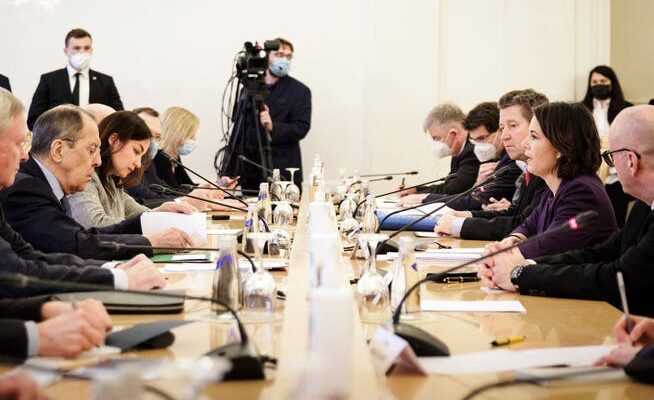The warnings of a Russian offensive in eastern Europe are wordy but not very specific. It can only be effective if the USA and Western Europe make it credible that the deterrence of Moscow is worth a high price.
The German Foreign Minister, Annalena Baerbock, is seeking talks in Moscow.
Two C-17 military transport aircraft flew into Ukraine from a base west of London on Monday. They made a wide berth over the Baltic Sea to avoid flying over Germany. The flights were part of a new British operation to bolster Ukraine’s defenses against a massive deployment of Russian troops across the border. Defense Secretary Ben Wallace announced in Parliament on the same day that Britain has begun supplying Ukraine with light anti-tank weapons. In addition, a small detachment of British military experts will instruct the Ukrainian army in handling the weapons.
On the same day, the new German Foreign Minister, Annalena Baerbock, was in Kiev. She categorically rejects the demand of her Ukrainian host Dmitro Kuleba to support the country with arms deliveries against Russia’s military superiority. Instead, she talked a lot about peace and solidarity and a new cooperation on climate policy.
The simultaneous appearances of the representatives of two European NATO countries could not be more different. Britain is backing up Wallace’s concerns about the threat in Eastern Europe with action. Not that the British anti-tank weapons supplied could decide a war. Russia’s superiority in troops and heavy equipment is so overwhelming that no one expects Ukraine to be able to defend its borders against a major offensive. But the British arms shipments make it clear that London is ready to act.
Germany, meanwhile, is only willing to talk. And not always in a helpful way. Leading Social Democrats have again categorically ruled out sanctions against the new Russian natural gas pipeline Nord Stream 2 in the past few days. The designated CDU chairman Friedrich Merz was quoted on Monday as saying that excluding Russia from the Swift international payment system would be wrong. He justified this with the justified concern that this could burden the financial markets and also cause high economic costs for the West. With regard to the pipeline and Swift, German leaders are thus opposed to two of the most frequently discussed sanctions measures intended to prevent Russia from attacking Ukraine.
The rhetoric in Brussels seems similarly hesitant. The EU is also eloquently warning of an escalation. All responsible security and foreign politicians in Europe are aware that a major Russian offensive in Ukraine has meant the heaviest military threat on the continent for decades. But concrete measures to deter Moscow are a long time coming.
It is once again left to the United States and its traditionally closest ally, Great Britain, and a few other countries to create a credible backdrop for deterrence. But even there, the threats leave much to be desired in terms of clarity. President Biden has threatened Russia with severe economic consequences in the event of an attack on Ukraine. But he didn’t make it clear what exactly he meant by that. The White House is also acting cautiously with arms deliveries, which have reached a volume of 2.5 billion dollars since the annexation of Crimea in 2014. They are also limited to defensive systems and have not expanded dramatically in recent months.
If the USA were to actually pull out its entire list of possible sanctions against Russian banks, companies and ultimately also consumers, this would result in drastic costs not only for Russia but also for Western economies. But a look at the relative calm on the financial markets in the US and Europe shows that the likelihood of an economic war against Russia there is considered to be low. The Kremlin could take a similar view. The consequence would be a low deterrent effect.
If the NATO states or the European Union really want to deter effectively, they have to increase the expected costs of an attack for Moscow as much as possible. This includes two things: First, it must be credible that the West would actively support a Ukrainian resistance or guerrilla struggle against the overpowering opponent – this also necessarily includes arms deliveries. Second, the West must demonstrate its willingness to accept high and long-lasting economic losses as part of an effective sanctions regime against Russia. In both cases, the Western governments could still become much clearer.
